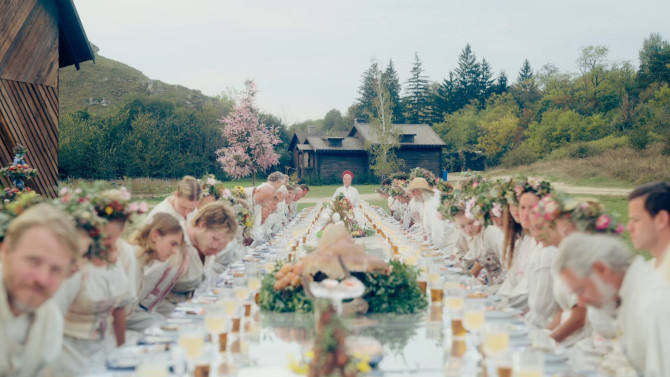If you were ever to create a list of unsafe places to travel, it is unlikely that Sweden would even make it anywhere near that piece of paper, or tech device – for those more modern individuals. Though after watching 2019’s Midsommar, written and directed by Ari Aster (who exploded onto the scene with 2018’s Hereditary), some people might be reconsidering the stunning Scandinavian country.
A slow burner of a dark horror mystery fairytale in the vein of The Wicker Man (preferably the 1973 vehicle starring Christopher Lee rather than the 2006 remake with Nicholas Cage), this narrative starts off in a pretty dark and depressing way. Let’s just say that Dani (Florence Pugh – Little Women), who is in her early twenties, becomes orphaned in the blink of an eye.
On the rocks with her rather noncommital boyfriend, Christian (Jack Reynor), she is always apologizing for burdening him, so afraid of losing her only remaining close connection. He seems less enthused. . . most of his friends don’t help – Josh (William Jackson Harper), and especially Mark (Will Poulter), are always trying to steer their buddy out of his three year long relationship. It is only Pelle (Vilhelm Blomgren), the group’s Swedish exchange student friend, who seems smitten with her. . . perhaps a crush, or something else?
With an obvious lack of communication, Christian hasn’t informed his gal that he and his friends are heading to Sweden with Pelle – to attend the little known Midsommar festival. . . in fact, Josh is going to do his thesis on the ancient celebrations, while Christian is looking to find himself (and his own unique thesis along the way). Of course, Dani discovers this, and the rather chicken-hearted and guilty Christian invites her along. . . much to the chagrin of Josh and Mark.
Like some sort of fantastical, otherworldly landscape, Pelle lives in a nature-centred commune in the middle of nowhere (surrounded by lush forests, intriguing rock formations, and picturesque farmland). . . and this just happens to be the most important of their summer festivals – one only celebrated every ninety years. Outside of the four Americans, the only other invited guests are two Brits, Simon (Archie Madekwe) and Connie (Ellora Torchia).
With only a few sporadic buildings on the acreage, the young sleep together in a giant edifice, the elderly elsewhere, while a triangular yellow structure is the big mystery – so holy that no one is allowed into it. At first seeming like a pagan paradise, some of their tributes to the natural world are quite jarring. . . especially to their very modern guests. Though it intrigues thesis writing Josh, and while Mark is simply looking to bed one of the sultry Swedes, these moments are too much for Dani – who is already traumatized from what has so recently happened to her.
Like a two hour and twenty-eight minute fuse leading to an explosive powder keg, this is all about the slow build. Aster painstakingly coaxes us into the story (that is, after that aforementioned jarring opening moment), ominous little teases mixed with old pagan customs. . . a warning to the audience as things slowly become more clear that all is not what it seems. Framed in an eerily symmetrical way (that often bizarrely feels like it is somehow the utter opposite), it is a bit like an off-kilter version of a Wes Anderson film combined with a more traditional, old school horror flair. There are also some other nice touches – Aster purposely doesn’t subtitle the Swedish dialogue (further creating a sense of isolation for the Americans. . . and Brits), while the use of magic mushrooms and other hallucinogens provide a slightly distorted version of reality – the visuals putting the viewer in a similar state of mind.
Of course, for keen eyed viewers, you’ll spot some noticeable clues – the art found in Dani’s apartment (which reinforces this story’s fairytale aspects, while also suggesting some of the future outcomes), the insert shots of the murals done within the commune abodes (as well as the art on how to make their love potion found outside), and so many other little flourishes. While I would also pay attention to the opening mural shown – for at first it might not seem related at all, but trust me, it is.
A horror story of loss, depression and grief, of trying to find a family, of relationship issues, and of the clash between tradition and modernity, Midsommar is best enjoyed without having done too much research (or having seen The Wicker Man – as they have very similar arcs), so hopefully you’ll just turn it on and go for the slow ride. There is a lot to absorb: fascinating flashbacks, intriguing lore, well constructed characters, visceral visuals, nods to Swedish history. . . all nice pieces (or dare I say – a smorgasbord) of a horror film that will likely transform it into a ‘cult’ classic in the years to come. So, enjoy this unique 21st century vision of an alternate Sweden, in many ways it is a baptism by fire.





The light — the creepy Disney luminosity — signalled the horror tone and writer/director Ari Aster delivered fulsomely. All mass movements have a despot with a socially engineered big idea in the future somewhere. Alternative centres of power must be crushed for the survival of the collective. Totalitarianism anyone? Let’s have a show of hands!